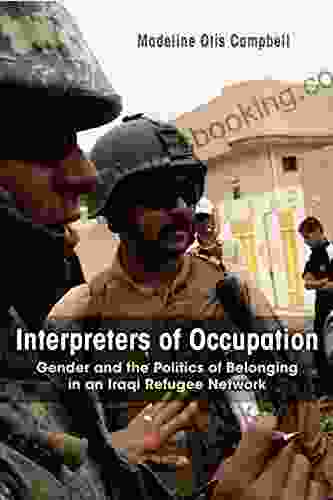Gender and the Politics of Belonging in Iraqi Refugee Networks: A Cultural Examination

5 out of 5
| Language | : | English |
| File size | : | 2875 KB |
| Text-to-Speech | : | Enabled |
| Screen Reader | : | Supported |
| Enhanced typesetting | : | Enabled |
| Word Wise | : | Enabled |
| Print length | : | 263 pages |
The displacement of Iraqi refugees due to conflict and persecution has created complex and challenging circumstances for individuals and communities alike. Amidst the challenges of resettlement, the interplay of gender and culture plays a pivotal role in shaping their experiences of belonging and integration within their new environments. This article aims to delve into the intricate relationship between gender, culture, and belonging in Iraqi refugee networks, exploring the dynamics that influence their social and cultural experiences.
Gender Roles and Expectations
Gender roles are socially constructed norms that dictate appropriate behaviors, attitudes, and responsibilities for individuals based on their sex. Within Iraqi culture, traditional gender roles often assign men the role of breadwinners and protectors, while women are expected to fulfill domestic duties and caregiving responsibilities. However, the displacement experience disrupts these traditional roles, creating opportunities for renegotiation and change.
In refugee networks, women may assume non-traditional roles to contribute to their families' well-being, such as income-generating activities or community engagement. This shift in gender roles can challenge traditional expectations and foster a greater sense of empowerment among women.
Cultural Identity and Belonging
Cultural identity refers to the shared beliefs, values, customs, and practices that define a group of people. For Iraqi refugees, cultural identity is intricately linked to their experiences of displacement and resettlement. The maintenance of Iraqi cultural practices and traditions serves as a source of comfort and continuity in the face of change and uncertainty.
Belonging is a fundamental human need that involves feeling connected to a community and having a sense of purpose and value. For Iraqi refugees, the negotiation of belonging occurs within the context of their cultural identity. Refugee networks provide a space for individuals to connect with others who share similar experiences and values, fostering a sense of community and belonging.
Intersectional Experiences of Belonging
The experiences of belonging and integration for Iraqi refugees are not monolithic. Intersectional factors such as age, class, religion, and education intersect with gender and culture to shape their experiences.
For instance, younger refugees may have greater opportunities to adapt to their new environment and establish new social networks, while older refugees may face challenges in navigating cultural differences and rebuilding their lives in unfamiliar settings. Similarly, refugees with higher levels of education may have better access to resources and employment opportunities, which can facilitate their integration into the host society.
Challenges and Opportunities
The negotiation of gender and belonging within Iraqi refugee networks presents both challenges and opportunities. Women may face discrimination and exclusion due to societal biases and cultural stereotypes. Additionally, the challenges of displacement can exacerbate existing gender inequalities.
On the other hand, refugee networks can provide a supportive environment for women to empower themselves and challenge traditional gender roles. They can also facilitate access to resources, education, and support services that promote their well-being and integration.
Policy Implications
Understanding the intricate relationship between gender, culture, and belonging in Iraqi refugee networks has important policy implications. Governments and humanitarian organizations should consider the following:
* Promote gender equality and women's empowerment through targeted programs and initiatives. * Support refugee networks and community-led initiatives that foster a sense of belonging and integration. * Address the specific needs of vulnerable populations, such as women and children, through tailored support services. * Encourage the participation of refugees in decision-making processes that affect their lives.
The interplay of gender, culture, and belonging is a complex and multifaceted issue for Iraqi refugees. The negotiation of these factors influences their experiences of displacement, resettlement, and integration. Refugee networks play a crucial role in providing a sense of community and belonging, while also presenting opportunities for challenging traditional gender roles and empowering women. By understanding the dynamics of gender and belonging, we can create more inclusive and supportive environments for Iraqi refugees, fostering their well-being and successful integration into their new communities.
5 out of 5
| Language | : | English |
| File size | : | 2875 KB |
| Text-to-Speech | : | Enabled |
| Screen Reader | : | Supported |
| Enhanced typesetting | : | Enabled |
| Word Wise | : | Enabled |
| Print length | : | 263 pages |
Do you want to contribute by writing guest posts on this blog?
Please contact us and send us a resume of previous articles that you have written.
 Book
Book Novel
Novel Page
Page Chapter
Chapter Text
Text Story
Story Genre
Genre Reader
Reader Library
Library Paperback
Paperback E-book
E-book Magazine
Magazine Newspaper
Newspaper Paragraph
Paragraph Sentence
Sentence Bookmark
Bookmark Shelf
Shelf Glossary
Glossary Bibliography
Bibliography Foreword
Foreword Preface
Preface Synopsis
Synopsis Annotation
Annotation Footnote
Footnote Manuscript
Manuscript Scroll
Scroll Codex
Codex Tome
Tome Bestseller
Bestseller Classics
Classics Library card
Library card Narrative
Narrative Biography
Biography Autobiography
Autobiography Memoir
Memoir Reference
Reference Encyclopedia
Encyclopedia Immigrant Writers Association
Immigrant Writers Association Ian Adamson
Ian Adamson Porter Fox
Porter Fox International Monetary Fund
International Monetary Fund J Douglas Faires
J Douglas Faires Timothy Brook
Timothy Brook Natsuki Takaya
Natsuki Takaya J T Baier
J T Baier J H Shapiro
J H Shapiro Iwan Rhys Morus
Iwan Rhys Morus Iain Sinclair
Iain Sinclair Peter Millar
Peter Millar Ilhan Omar
Ilhan Omar J R Harris
J R Harris Howell Leonard
Howell Leonard Joshua Wolf Shenk
Joshua Wolf Shenk Insun Lee
Insun Lee Sarah Lynne Bowman
Sarah Lynne Bowman Tony Hillerman
Tony Hillerman Isabel De Ron
Isabel De Ron
Light bulbAdvertise smarter! Our strategic ad space ensures maximum exposure. Reserve your spot today!

 Rodney ParkerSink Your Teeth into Sweet Delights: The Buttercream Collection of the Best...
Rodney ParkerSink Your Teeth into Sweet Delights: The Buttercream Collection of the Best...
 Cody RussellFeels Like Family: The Sweet Magnolias - A Literary Masterpiece that Tugs at...
Cody RussellFeels Like Family: The Sweet Magnolias - A Literary Masterpiece that Tugs at... Ira CoxFollow ·13.7k
Ira CoxFollow ·13.7k Denzel HayesFollow ·18k
Denzel HayesFollow ·18k Jeffrey CoxFollow ·4.6k
Jeffrey CoxFollow ·4.6k Demetrius CarterFollow ·14k
Demetrius CarterFollow ·14k Dale MitchellFollow ·4k
Dale MitchellFollow ·4k Clay PowellFollow ·18.8k
Clay PowellFollow ·18.8k George MartinFollow ·15.2k
George MartinFollow ·15.2k Orson Scott CardFollow ·19.4k
Orson Scott CardFollow ·19.4k

 Luke Blair
Luke Blair101 Amazing Facts About Australia: A Journey Through the...
A Literary Expedition Unveiling the Treasures...

 Harry Hayes
Harry HayesWitness the Velocity and Legacy of the Scarlet Speedster:...
Delve into the Lightning-Charged...

 Stan Ward
Stan Ward101 Amazing Facts About Ancient Egypt: Unraveling the...
: A Timeless Realm of Wonder Ancient Egypt, a...

 Stephen King
Stephen KingEscape into Adventure: Unveil the Secrets of Adventure...
In the annals of comic book history,...

 Forrest Blair
Forrest BlairThe Oxford Dog Training Company Presents: A Holistic...
In the realm of dog...
5 out of 5
| Language | : | English |
| File size | : | 2875 KB |
| Text-to-Speech | : | Enabled |
| Screen Reader | : | Supported |
| Enhanced typesetting | : | Enabled |
| Word Wise | : | Enabled |
| Print length | : | 263 pages |










